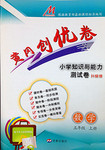题目内容
—Look! A _____ man is walking across the street. Let’s go and help him.
—OK. Let’s go.
A.strong B.blind C.deaf
练习册系列答案
 黄冈创优卷系列答案
黄冈创优卷系列答案
相关题目
题目内容
—Look! A _____ man is walking across the street. Let’s go and help him.
—OK. Let’s go.
A.strong B.blind C.deaf
 黄冈创优卷系列答案
黄冈创优卷系列答案